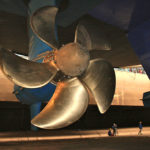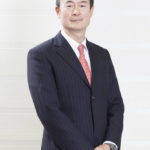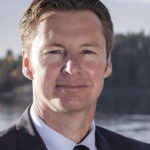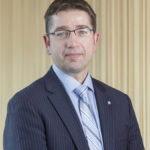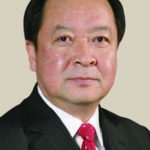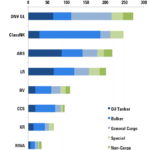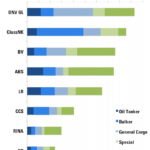Classification societies and their global association IACS look back at a busy year. However, the future brings more challenges as the industry sees rapid technological and regulatory changes
At the global level, the IACS Chairmanship on 1 July ’17 was passed on from Sun Licheng, President of China[ds_preview] Classification Society (CCS) to Knut Ørbeck-Nilssen, CEO Maritime, DNV GL. Reflecting on his year in office, Sun stated, »Collectively, the IACS members have accomplished a range of initiatives including signing an historic agreement with the IMO, achieving full GBS (Goal-based Ship Constrution Standards for Bulk Carriers and Oil Tankers) compliance, promoting work on cyber safety and innovative survey techniques.« As well, IACS celebrated the 25th anniversary of its Quality System Certification Scheme (QSCS).
Actions have been taken to update the current documents and recommendations in relation to application of new testing technology, such as non-destructive testing (NDT) and Remote Inspection Techniques (RIT), for example, drones, Remotely Operated Vehicles and climbers.
Robert Ashdown, IACS Secretary General, puts an emphasis on the global level as preferred arena of regulation: »As the shipping’s regulatory regime continues to evolve and expand, IACS works […] to ensure that the necessary legislative framework is underpinned and enhanced by class rules that allow for its practical implementation.« »We firmly believe that the global industry should be subject to global regulation as developed by the IMO. When working with other stakeholders, IACS encourages the development of proposals that are global in scope and capable of uniform application,« Ashdown adds.
The current »hot topic«, cyber safety, is also high on the association’s agenda. Last year already, a new panel started work. »For IACS, cyber safety is now just as much a part of the fundamentals of maritime safety as the hull or machinery systems,« it says in its annual review.
For the following section, HANSA has asked the top 8 classification societies and their executive representatives to provide statements on their businesses, plans and expectations for the market and upcoming topics.
Knut Ørbeck-Nilssen, CEO Maritime, DNV GL
Over the past twelve months our surveyors have been carrying out many surveys using camera-equipped drones to check the condition of remote structural components on board ships and offshore units.
DNV GL is currently building a network of trained drone pilots. At the same time, we are working on developing guidelines and potentially updating our rule set to reflect the use of remote inspection techniques.
Our DATE service (direct access to technical experts) is being made more effective through machine learning algorithms which can deliver faster and more accurate responses.
We are working hard to assist the industry in moving towards a more sensor based classification, with solutions focused on quality assurance in a digital value chain and with new insights based on data streams. We believe these 3rd party solutions will be necessary to realize the advantages digitalization may offer the shipping industry.
Towards the end of the year, DNV GL will also start using intelligent software agents to help customers find the best time and place to book a survey. The introduction of the Simple Survey Booking tool will simplify survey booking, fitting inspections into the customers’ schedule while saving time and costs. It will offer up-front cost estimates.
The next game changer is a combination of three trends. Ships are becoming more automated and are increasingly dependent on software-based control systems. Machinery systems are also increasingly being controlled by software and fitted with low-cost, smart sensors.
Similarly, marine navigation systems will increasingly rely on advanced software and sensors. As these systems play more of a role in the design, construction and operation of vessels, we will need a way to test them before they hit the water and throughout the life cycle. This will require the use of digital twins. Finally, the rise of ships as cyber-physical systems and the use of digital twins put the spotlight on the need for trustworthy, integrated data platforms.
Cybersecurity will be an area of increased importance, where global regulations will be more useful than regional initiatives.
DNV GL has no plans to participate in any further consolidations in the classification market. We believe that competence and innovative capabilities e.g. in the digital transformation will require robust classification societies going forward. Therefore, DNV GL would welcome more robust players.
Junichiro Iida, Executive Vice President, ClassNK
As we come into the age of the Internet of Things, we have focused a portion of our resources on developing the latest technologies and solutions to open up the advantages of IoT. At the forefront of these efforts is our flagship project, Ship Data Center. ShipDC operates a land-based center collecting data from ships in operation using VDR, data logger and other sources, as well as weather information at sea. Our objective is to create an open platform for big data related to shipping by securely collecting, storing and providing data to users.
We established ClassNK Archive Center (NKAC) in July 2016 fully complying with IMO Goal-based ship construction standards (GBS).
Very important for us is that we recently issued Statements of Compliance in line with the Hong Kong Convention (HKC) to promote the safer and greener ship recycling practice. In addition to this, ClassNK developed PrimeShip-GREEN/SRM, a solution which allows users to develop a ship-specific Inventory of Hazardous Materials (IHM) identifying locations and quantities of hazardous substances as part of the proposed regulations of HKC.
We have already developed and issued Exhaust Gas Cleaning System Ready Full notations to nine ships, signifying that the fulfilment of requirements for SOx scrubber retrofitting.
ClassNK was one of the world’s first societies to receive accreditation from the UK-based national accreditation body UKAS as an EU MRV verifier.
We have made tangible efforts in regards to the upcoming Ballast Water Management Convention, including the development of the 3D laser scanning technology. This offers shipowners the opportunity to assess how to fit BWMS on their ships quickly, using 3D laser scanning to accurately measure available space automatically.
In addition, one of our most significant projects has been the new Guidelines for Liquefied Hydrogen (LH2) Carriers, issued in March 2017.
From ClassNK’s point of view, the industry game-changers will be the platforms that make digitalization and big data practical and straightforward for the maritime sector. Essentially, IoT will be one of the biggest drivers behind change in the industry.
ClassNK has opened new service offices in Nantes (France), Tehran (Iran), Izmir and Mersin (Turkey). We do not foresee any further consolidation of the market.
Christopher Wiernicki, President/CEO, ABS
ABS has maintained a focus on cyber risk in marine and offshore industries. As systems become more connected and integrated, ships become exposed to new risks and vulnerabilities. ABS was the first class organization to publish guidance and issue notations to help address these new cyber risks – known as the ABS CyberSafety series.
In a shipping industry context, we wanted to provide a scalable, stepwise approach to a vast subject that covers both Information Technology and Operational Technology risks. Our assessments for clients are helping them to manage the hacking threat and build concepts such as cyber hygiene and best practices.
Over the next three to five years we will see major changes start to happen in ship design and construction that will usher in an era of smarter shipping in the next generation of assets delivered. ABS is positioned to use new tools and techniques to make the class process more data-driven and thus more predictive and less intrusive, so that owners can make better decisions about their assets.
In support of the key Greek market, ABS in mid-June unveiled its Global Ship Systems Center and announced the formation of a new Hellenic Technical Committee. This facility brings together industry-recognized technical leaders to support clients throughout the entire lifecycle of their assets. Through a systems-based approach, the Global Ship Systems Center addresses the increasing complexity of mechanical and cyber-enabled systems onboard vessels. As these systems are increasingly interconnected and optimized, a more advanced approach to address design and construction is required.
Increased digitization is changing the way the world operates. Foundational to digitization is data and the connectivity of that data. For the marine industry this means that through data gathering and greater use of automation, owners and operators have visibility into real-time information.
Proper data collection, security, management and analytics can be used to help better anticipate and predict safety, security, performance and maintenance issues, driving reduced downtime and helping find new efficiencies. Digitization is facilitating new ways of applying data and optimizing shipping entirely.
We know that the industry wants to see greater alignment between costs and benefits of regulation so that the issues around ballast water, for example, are not repeated. This seems a sensible approach and one that balances the regulatory imperative with the availability of solutions that owners can adopt. As we move ahead, I expect that there will be increased industry focus on creating more alignment between regulations on a global basis. Industry is supportive of common standards to help prevent uncertainty and increased costs.
Nick Brown, Marine & Offshore Director, Lloyd’s Register
During the last twelve months Loyds Register (LR) has continued to invest in new technologies alongside working to implement smarter and more effective ways of servicing our global client network. Additionally, the alignment of our Marine and Offshore businesses is continuing to prove beneficial to our success.
This year we have seen some very significant Offshore projects commence and the successful completion of Shell’s »Prelude« project. The learnings our team and the industry as a whole gain is invaluable.
An example of how our innovation team is starting to deliver more agile products and services that are subject to a much quicker adoption cycle is the recent certification of the LPG carrier »Trammo Dietlin«. In July last year we launched our guidance for the classification of autonomous ships and within one year we have already had a ship fully certified against these class notations.
We have also seen Rolls-Royce and Svitzer successfully demonstrate the world’s first remotely operated commercial vessel in Copenhagen, with assurance provided by LR against our cyber-enabled ships ShipRight procedure.
LR is already global and present in most locations where there is trade so there is little potential for us to expand regionally. In terms of our service portfolio we do see a significant increase in the opportunities for us to support around the data and digital movement within the industry, whether that be through bespoke consultancy with our Cyber Secure service, or our guidance for the classification of autonomous ships.
We are looking to find more partners who are offering a data and digital service outside of our industry but looking to expand into it.
In terms of technology hardware I think that batteries, in combination with power management systems, to deliver hybrid powering solutions is something that will become significantly more widespread going forward, particularly as the industry works towards phase three of the EEDI (Energy Efficiency Design Index) implementation in 2025.
However, probably the biggest single game-changer going forward that will be enabled via technology is data analytics, which will support a much more responsive way of understanding how assets are performing. This could lead to more dynamic ways in which rules and designs are developed.
Philippe Donche-Gay, Executive Vice-President Marine & Offshore Division, Bureau Veritas
Innovation and service are most important for Bureau Veritas. We have just celebrated the delivery of the »Christophe de Margerie«, the BV-classed Yamal LNG carrier with innovative podded propulsion, stern-first ice capability built to operate in Arctic winters. Gas-related services have required high levels of BV service delivery in the last year. In June, the first STS transfer of LNG has taken place from the BV classed bunker vessel »Engie Zeebrugge«. Our cooperation with Meyer yards has been another highlight – the LNG fuelled »Megastar«, delivered from Meyer Turku, is an innovative LNG related project. Recently announced was Brittany Ferries commitment to build their new gas fuelled cross-channel ferry at Flensberger Schiffbau. This is an exciting project for us.
LNG is an area where we remain ambitious and we would like to see our LNG sector capabilities and market share continue to grow. We already have a leading share of the LNG fuelled ships orderbook and an approximately 35% market share of FSRUs in service and under construction.
Although orders for bulk carriers, tankers and containerships declined dramatically in 2016, we have been contracted for newbuilding projects in sectors requiring smaller, specialized tonnage.
Another example of innovation has been in the development of Bureau Veritas’ electric-hybrid rules. Our new asset integrity management solution, Veristar AIM 3D, is a next generation Asset Integrity Management (AIM) solution for the shipping and offshore industries to reduce the CAPEX and OPEX exposure of operators. It can be used from the design stage, through construction, and throughout the operational lifecycle. It could lead to a complete change in how inspection, maintenance and repair activities are prepared and reported.
Integrating the latest acquisitions, TMC Marine and MAC, has been another key area of activity. Rather than adding to or expanding our global presence we have to find ways to use our network ever more effectively. Further consolidation may be logical but is probably also unlikely right now.
The next game changer? Effective use of data and assets integrity management to increase efficiency and reduce costs will be big. We can probably expect to see continued tightening of environmental regulation and the introduction of carbon pricing or market based measures at some point.
Sun Licheng, President, CCS
2016 was a significant year for us. We celebrated our 60th anniversary, secondly CCS chaired IACS from July 2016 to June 30, 2017.
We plan to speed up the layout of global service network. At present, the Fukuoka survey station of the North-East Asia Center and the Santiago Office of the American Center are going to open soon; offices in Yosu, Paris, Ghana and St. Petersberg are currently being prepared. In addition, we are planning to establish offices in Teheran, Bangkok, Rio, Chicago, Toronto or Montreal, Durban and other places.
In the future, CCS will continue to expand the service area. In March, CCS Greece officially obtained the certification and authorization of the new EU Marine Equipment Directive 014/90/EU and became the EU Notified Body in June, CCS was accredited by the Denmark National Accreditation body DANAK to carry out verification of the monitoring, reporting and verification of carbon dioxide emissions from maritime transport. In 2017 we have also signed the »agreement of cooperation on laboratory« with TüV Rheinland.
CCS will increase investment in unmanned ships, intelligent ships, cyber security, and new energy application, such as LNG full production chain service.
Since there is no apparent opportunity of merger, CCS has no such plan in the short term.
For the present, the paramount priority is to strengthen the implementation of the rules and standard by the maritime industry and be cautious to introduce new regulations.
New regulations in the future will focus on cyber, intelligence, the impact on ship structure, operation, navigation and environment protection performance due to the use of new energy and other innovative technology. In order to satisfy the demand for unmanned ships by the industry, a corresponding rule and regulation system should be established.
In the field of emissions reduction from shipping, the application of new technology to improve energy efficiency and study of new green energy/power system application will still be the focus. According to the development trend of the intelligent ship big data in the future, researches will be carried out in comprehensive ship energy efficiency management.
Challenges for safety include the effective application of risk evaluation, promotion of legislative optimization and focusing on modern intelligent technology application in fields such as cyber security, digitalization, big data, data exchange, drone survey, automatic navigation ships/unmanned ships, etc.
Lee Jeong-kie, CEO, Korean Register
Korean Register (KR) opened a new ICT (information communications technology) Center to dramatically enhance the application of advanced information and ICT across the maritime and ship classification industries in March 2017. It seeks to address the fact that advanced onshore technologies have been difficult to adapt for maritime applications because of the poor communications environment at sea and unique attributes of ships. It is initially focused on four areas of advanced technology, maritime big data, e-navigation, ship cyber security and software quality assurance. ICT (Information and Communications Technologies) to the maritime and ship classification industries has developed enormously over the last twenty years and KR’s experts see no sign of this slowing.
We have been approved by Germany’s National Accreditation Body (DAkkS) to act as a verification body for EU MRV (Monitoring, Reporting, Verification).
In September 2016, KR opened its new facility for Ballast Water Management System (BWMS) testing. The test facility, which already offered the largest capacity for BWMS testing, has been significantly expanded. It is now composed of four units (three of which are new) with one challenge water tank (with a 2,000 m3/h capacity). We have been accepted as the first Independent Laboratory in Asia to be accredited by the United States Coast Guard (USCG IL).
More regulations are expected in the fields of cyber security on board ship. These systems must comply with international standards. In addition, whilst technological solutions in the field of maritime autonomous surface ships are being developed and deployed, there is a lack of clarity about the correct application of existing IMO instruments. As well, with respect to GMDSS (Global Maritime Distress and Safety Systems), there have been numerous advances in the use of maritime radio communication for maritime safety, security and environmental protection. But there is also some obsolete GMDSS equipment and systems, or some that have seldom or never been used in practice.
We continue to work to increase its market share in the global market and is expanding its third party inspection services in various industry sectors including the energy sector to achieve this. Our international network currently stands at 66 offices, and this will be increased to 100 offices over the next few years. KR’s overseas market expansion strategy could be described as »Glocalization«, using local experts to liaise directly with local customers.
Paolo Moretti, COO Marine, RINA
In the last twelve months we focussed very much on markets where we are strong: passenger, cruise, ferries, RoRo, yachts. These are the only sectors that see some light. And they will stay strong for the next three to five years.
A very important step for us was the signature for Carnival’s newbuildings to be built at Meyer Werft. They are the largest cruise ships with LNG technology. That made us very proud.
When cruise vessels are built in Asia, we try to follow our clients. The shipyards there still have to gain experience for production processes and questions concerning regulations. For them, we do consulting services.
We see more and more ship owners, who were not used to call us when looking for a classifcation partner. Today, they have real bidding processess and we are always invited. This is not for newbuildings, but for services this business is getting more important for us. It will grow in the next three to five years.
In addition, we believe we can grow in other areas as well: LNG as fuel is one of these businesses. Another one is the oil/gas sector, which is completely down now. But this is the moment where you can meet potential clients. When the market goes up again, we want to be there and ready for business.
In the future we might see several important developments with impacts on our business. One example is 3D printing in manufacturing. It is still at the beginning, but intensifying. Alternative fuels will be more regulated. We hope it will be international and harmonized. Otherwise, it doesn’t help shipowners. Everybody is exploring unmanned vehicles, but I think the first step will be a more telematic approach with data transfer. However, the use of drones and submersible vehicles for safety and inspections will grow.
Competition is going to be tougher and longer. But I don’t see any more big mergers after the one of DNV and GL.





